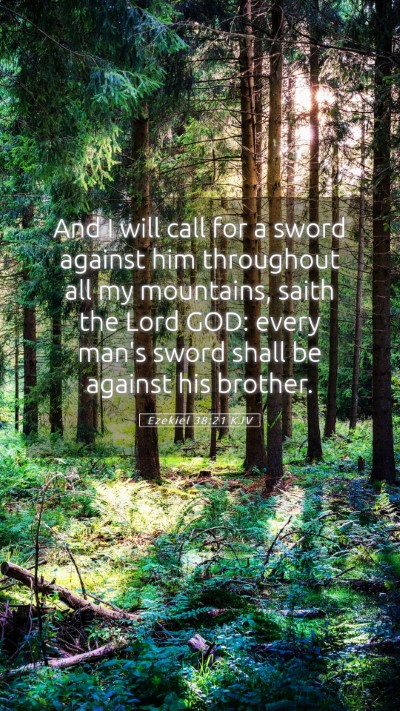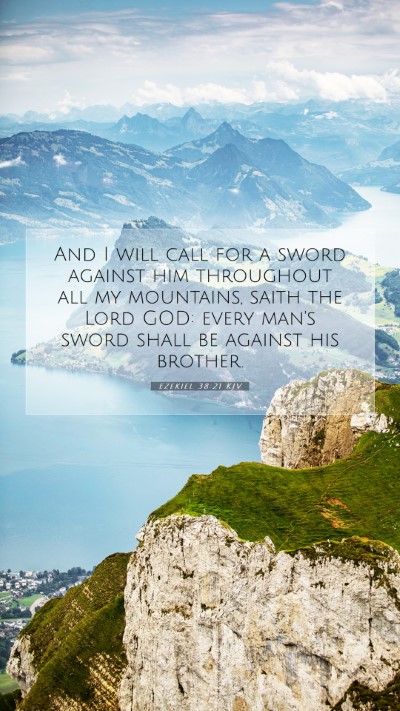Bible Verse Commentary: Ezekiel 38:21
Verse: "And I will call for a sword against him throughout all my mountains, saith the Lord GOD: every man's sword shall be against his brother." (Ezekiel 38:21)
Overview: This verse depicts God's response to the impending invasion by Gog and Magog. The imagery used illustrates a divine orchestrated confusion among the enemy troops, leading them to turn against each other.
Insights from Public Domain Commentaries
Matthew Henry's Commentary
Matthew Henry notes that the phrase "I will call for a sword" signifies God's sovereign power over nations. He explains that God's purpose is to execute judgment on those who oppose His people. The mountains represent elevated positions of conflict where the battle takes place. He emphasizes that the internal strife among enemies is a testament to God's intervention and control over the affairs of man. This reflects God's protection of Israel, ensuring that even in the face of overwhelming opposition, He will bring about their deliverance.
Albert Barnes' Notes
Albert Barnes provides a historical context, suggesting that this prophecy alludes to a future battle during which God intervenes on behalf of His people. He highlights the notion that God will turn the weapons of the enemy against themselves. This dual aspect of judgment not only reveals God's might but serves as a warning to those who would engage in conflict with the Lord's chosen. Ultimately, Barnes interprets this as a confirmation of God's fidelity to His promises and His readiness to defend His people against all adversarial forces.
Adam Clarke's Commentary
Adam Clarke writes that the phrase "every man's sword shall be against his brother" suggests a great confusion and disarray among the enemies. Clarke underscores the psychological and spiritual dimensions of battle, noting that God does not merely assail the physical enemies but also instills a sense of terror and division among them. This aligns with Clarke's view of God's overarching authority—He is able to create discord even before a battle physically commences, demonstrating His unmatched power to orchestrate the events of history.
Meaning and Application
The essence of Ezekiel 38:21 reveals several layers of meaning, enlightening readers on God's divine sovereignty and His role as a protector. Understanding this verse provides essential insights for anyone engaged in Bible study groups or seeking Bible study tools that enhance their Biblical exegesis.
- Divine Sovereignty: The term "I will call" emphasizes God's active role in world affairs, reminding believers that He is ultimately in charge.
- Protection of God's People: The chaos among the enemies symbolizes God's divine defense of Israel, encouraging believers to trust in His protection.
- Judgment on the Wicked: The verse serves as a warning that those who rise against God and His people will not prevail.
Cross References
- Zechariah 14:13: A similar theme of divine confusion among enemies.
- Revelation 17:14: The Lamb conquers those who oppose Him.
- Isaiah 19:2: God's intervention leading to strife among the nations.
Conclusion
Ezekiel 38:21 is not just a historical prophecy but a profound lesson on the nature of conflict and God's provision. For those looking for Bible study insights and discussions on understanding Scripture, reflecting on verses like this can illuminate our understanding of God's character and His active role in our lives. The significance of this verse remains relevant, urging believers to analyze how its implications can be applied to daily life, as well as to seek deeper engagement through resources such as Bible study guides and Bible study lessons.


